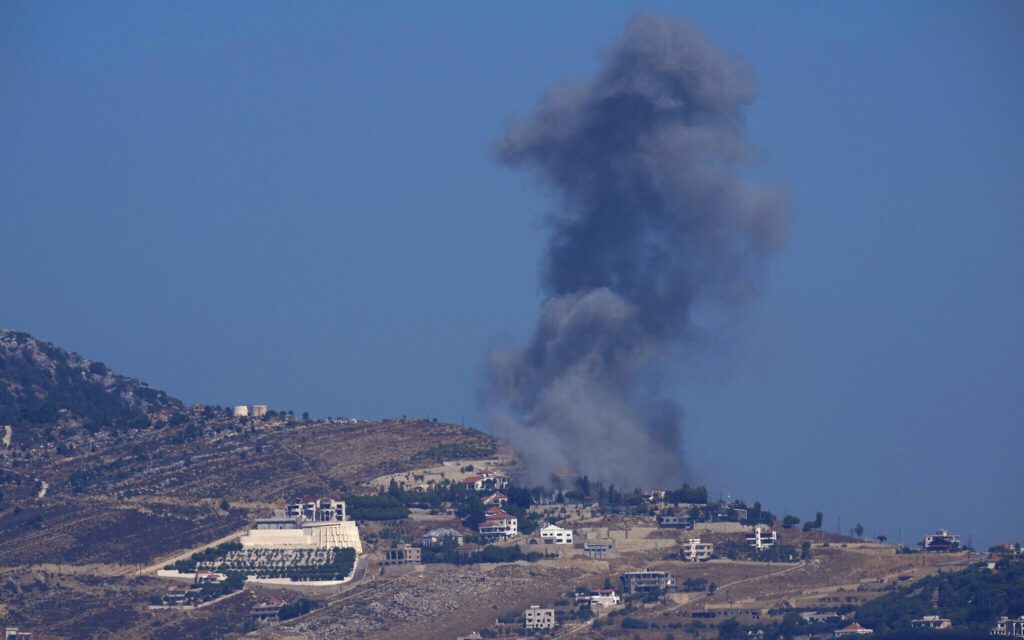On September 25, the Israeli military reported striking 280 Hezbollah targets, including 60 identified as intelligence sites, as well as 400 medium-range rocket launchers and approximately 70 anti-aircraft missile storage facilities.
These Israeli strikes on Lebanon have resulted in 51 deaths and 23 injuries, according to Lebanese Health Minister Firass Abiad.
The Israeli army added that its air force had conducted nearly 3,000 flight hours on Monday and Tuesday, with over 250 planes dropping around 2,000 missiles on 1,600 targets.
Earlier today, Hezbollah fired a mid-range missile at Mossad headquarters near Tel Aviv. Though intercepted, the attack signaled Hezbollah’s potential for greater damage.
As Israel intensifies its bombing campaign across Lebanon, it is calling up two additional reserve brigades to the northern border, which has now become an active warzone.
Since Israel’s attacks on Lebanon began on Monday, more than 600 people have been killed, thousands injured, and at least 90,000 displaced. Nearly 40,000 of those displaced are seeking shelter in 283 sites, according to the UN.
Escalation: Today’s attacks
On September 25, Israel launched continuous strikes across southern, eastern, and central Lebanon. For instance, Israeli jets bombed Bint Jbeil, resulting in four fatalities, according to an updated report from the Lebanese Ministry of Health.
The ministry also reported two injuries from the Israeli strikes on Maroun al-Ras and one in Ainata, both in southern Lebanon.
A series of airstrikes targeted areas between Sohmor and Mashghara in the Western Bekaa district, as well as Tyre in southern Lebanon and Bnaafoul near Sidon.
The Israeli Air Force targeted homes in Ras Osta and Beshtelida, two Shiite-majority villages in the Jbeil district. Ambulances were dispatched to the scene, and smoke from the explosions was visible from Amchit in the same district, according to L’Orient Today. The Civil Defense reported transferring two individuals who were wounded in the strike on Ras Osta.
In the afternoon, Hezbollah claimed responsibility for two new strikes on Israel. The first targeted Kiryat Motzkin, north of Haifa, with “salvos of Fadi-1 missiles,” marking the second attack on this town on the same day.
The second strike targeted an explosives factory in Zikhron Yaakov, approximately sixty kilometers south of Haifa, using “a salvo of Fadi-3 rockets.” This site had also been targeted by Hezbollah during the night from Monday to Tuesday, according to L’Orient Today.
Israeli airstrikes on Lebanon “pave the way for a ground offensive”
Israel’s Northern Command Chief, Major General Ori Gordin, confirmed the start of a new phase in the war with Lebanon.
Speaking during a meeting with the 7th Division on Wednesday, he emphasized the ongoing “Operation Northern Arrows” and the need to prepare for a ground operation against Lebanon, according to a statement on the Israeli army’s X account. As a result, Israel has called up two additional reserve brigades to the northern border.
General Herzi Halevi, Chief of the General Staff of the Israel Defense Forces, addressed Israeli soldiers today, stating that airstrikes on Lebanon would continue with the aim of destroying Hezbollah’s infrastructure and paving the way for a potential ground offensive.
“You can hear the planes here; we are attacking all day, both to prepare the area for the possibility of your entry and to continue hitting Hezbollah,” Halevi told soldiers from an armored unit, according to an army statement.
The Israeli War Cabinet is expected to meet tonight to discuss the future of the war with Hezbollah.
Meanwhile, Hezbollah leader Hassan Nasrallah, in a recent speech, warned that any Israeli attempt to establish a buffer zone in southern Lebanon would end in failure.
“Biden must implement an arms embargo to end the slaughter”
U.S. Secretary of State Antony Blinken has warned that the risk of broader conflict in the Middle East is “acute,” as Washington and its allies work to prevent an all-out war between Israel and Hezbollah.
“The best answer is diplomacy, and our coordinated efforts are essential to preventing further escalation,” Blinken said at the start of a Gulf Cooperation Council meeting in New York City.
The U.S. has faced sharp criticism for not putting an end to the war on Gaza, now approaching its one-year mark, which critics argue has emboldened Israel to expand its attacks to Lebanon.
Congresswoman Rashida Tlaib of Michigan condemned the Biden-Harris administration for allowing Israeli Prime Minister Netanyahu and his far-right government to “operate with impunity” and commit “war crimes.”
“After facing no red lines in Gaza, Netanyahu is now extending his genocidal campaign to Lebanon, using the same tactics endorsed by the Biden-Harris administration,” Tlaib stated.
She also highlighted that U.S. weapons, which have already been used to kill over 500 people in Lebanon, including more than 50 children, have injured thousands of civilians, according to Al Jazeera.
“Deploying more U.S. troops and sending more bombs will only increase the suffering and bloodshed,” Tlaib said.
“The Biden-Harris administration has the power to stop this. President Biden must immediately implement an arms embargo to end the slaughter and de-escalate the risk of a wider regional war.”
